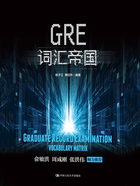
创新↔模仿
创新类词汇
ameliorate [ə'miːliəreɪt] 记忆次数 □□□□□□□□□□
释 v. to make better or more tolerable改善,包容
根 a-:加强 melior:更好 -ate:动词后缀,“使……” “使更好”→“改善”→“包容”
类 使改善
arresting [ə'restɪŋ] 记忆次数 □□□□□□□□□□
释 adj. catching the attention; striking; impressive 引人注意力的
根 ar-:加强 rest:停止,停留 -ing:形容词后缀 “使停留”→“吸引注意力” rest:休息[同根词]
类 使停留的
devise [dɪ'vaɪz] 记忆次数 □□□□□□□□□□
释 v. to form in the mind by new combinations or applications of ideas or principles; invent 发明,设计
v. to plan to obtain or bring about; plot 谋划
v. to give (real estate) by will 赠送给
根 de-:离开 vis=cis:切→分 “分开”→“赠送给”;“分开”→“分开进行”→“谋划”→“发明”“设计” decide:决定[同根词]
类 分步骤进行→设计,谋划
heresy ['herəsi] 记忆次数 □□□□□□□□□□
释 n. departure from a generally accepted theory, opinion, or practice 异端邪说
根 来源于拉丁文heresis(思想学派),被基督教作家当作“非正统教派的教条”,引申为“异端邪说”
类 异端邪说
improvise ['ɪmprəvaɪz] 记忆次数 □□□□□□□□□□
释 v. to make, invent, or arrange offhand 即兴创作
根 im-:否定 pro-:提前 vis:看→预知 “没有提前预知”→“即兴创作” visitor:参观者[同根词]
类 没有提前准备就运作
informed [ɪn'fɔːrmd] 记忆次数 □□□□□□□□□□
释 adj. educated, knowledgeable 有学识的
adj. having extensive knowledge especially of current topics and events 见多识广的,消息灵通的
根 in-:加强 form:形状→形成 -ed:形容词后缀 “形成的”→“形成体系的”→“有学识的”“见多识广的”“消息灵通的” format:格式[同根词]
类 形成体系的
ingenious [ɪn'dʒiːniəs] 记忆次数 □□□□□□□□□□
释 adj. showing or calling for intelligence, aptitude, or discernment 聪明的
adj. having or showing an unusual aptitude for discovering, inventing, or contriving 巧妙的
adj. marked by originality, resourcefulness, and cleverness in conception or execution 有创造才能的
根 in-:加强 gen:生→天生,产生 -ious:形容词后缀 “天生的”→“聪明的”→“巧妙的” “产生的”→“有创造才能的” generate:产生[同根词]
类 有创造才能的
innovative ['ɪnəveɪtɪv] 记忆次数 □□□□□□□□□□
释 adj. characterized by, tending to, or introducing innovations 创新的
根 in-:加强 nov:新 -ative:形容词后缀 “新的”→“创新的” Lenovo:联想[同根词]
类 创新的
inventory ['ɪnvəntɔːri] 记忆次数 □□□□□□□□□□
释 n. an itemized list of current assets 详细目录
n. a list of goods on hand 货物清单
根 in-:加强 ven(t):来→发现 -ory:名词后缀,表示物 “发现事物的列表”→“详细目录”;“发现事物的列表”→“货物清单” adventure:冒险[同根词]
类 发现事物的列表
novel ['nɑːvl] 记忆次数 □□□□□□□□□□
释 adj. new and not resembling something formerly known or used 新奇的
根 nov:新 -el:形容词后缀 “新的”→“新奇的”
类 新奇的
original [ə'rɪdʒənl] 记忆次数 □□□□□□□□□□
释 adj. of, relating to, or constituting an origin or beginning; initial 创新的
adj. not secondary, derivative, or imitative 原始的,最初的
根 ori(gin):升起 -al:形容词后缀 “升起”→“起源”→“原始的”“最初的”;“起源”→“创新的”
类 起源的
renovate ['renəveɪt] 记忆次数 □□□□□□□□□□
释 v. to restore to a former better state (as by cleaning, repairing, or rebuilding) 修复
v. to restore to life, vigor, or activity; revive 恢复活力
根 re-:再 nov:生→新生 -ate:动词后缀,“使……” “使再次新生”→“恢复活力”“修复” novel:新奇的[同根词]
类 使新生,使恢复(活力)
seminal ['semɪnl] 记忆次数 □□□□□□□□□□
释 adj. containing or contributing the seeds of later development; creative, original 有发展可能的,原始的,创新的
根 sem:种子 -in(e):名词后缀 -al:形容词后缀 “种子的”→“有发展可能的”→“原始的”→“创新的” seminate:散布[同根词]
类 各种种子的
常考词汇
creative:创新的
creativity:创新性
extraordinary:非凡的,特别的
inspire:激发灵感,鼓舞
reformer:改革的人
skeptical:好怀疑的
uncommon:非同寻常的
模仿类词汇
emulate ['emjʊleɪt] 记忆次数 □□□□□□□□□□
释 v. to strive to egual or match, especially by imitating 努力模仿并超越
根 e-:出 mul:努力 -ate:动词后缀 “努力超出”→“努力模仿并超越”
类 通过模仿而超越
imitation [ˌɪmɪ'teɪʃn] 记忆次数 □□□□□□□□□□
释 n. something produced as a copy; counterfeit 仿制品
根 imit:模仿 -ation:名词后缀 “模仿品”→“仿制品” imitate:模仿[同根词]
类 模仿、仿制品
impersonate [ɪm'pɜːrsəneɪt] 记忆次数 □□□□□□□□□□
释 v. to assume or act the character of; personate 模仿,扮演
根 im-:入 person:人→角色 -ate:动词后缀 “进入角色”→“模仿”“扮演” person:人[同根词]
类 使进入角色,模仿,扮演
mimic ['mɪmɪk] 记忆次数 □□□□□□□□□□
释 adj. imitative 仿真的
v. to ridicule by imitation 戏弄
v. simulate 模仿
根 mim:模拟表演 -ic:形容词后缀 “模拟表演”→“模仿”→“滑稽的模仿”→“戏弄”;“模仿”→“仿真的”
类 模仿,仿真
mock [mɑːk] 记忆次数 □□□□□□□□□□
释 v. to treat with contempt or ridicule; deride 嘲笑
v. to imitate (as a mannerism) closely; mimic 模仿
根 来源于古法语mocquer(嘲笑) “嘲笑”→“模仿(使逗笑)”
类 嘲笑,模仿
parody ['pærədi] 记忆次数 □□□□□□□□□□
释 n. a literary or musical work in which the style of an author or work is closely imitated for comic effect or in ridicule (为达到喜剧效果或嘲讽效果而进行的)拙劣的模仿
v. to imitate in the manner of a parody 拙劣模仿
根 par(a)-:旁边 ody:唱歌 “在旁侧唱歌”→“拙劣的模仿”“拙劣模仿”
类 通过模仿嘲讽
simulate ['sɪmjʊleɪt] 记忆次数 □□□□□□□□□□
释 v. to give or assume the appearance or effect of often with the intent to deceive; imitate 模仿
v. to make a simulation of (as a physical system) 模拟,仿真
根 sim:相似 -ul(e):形容词后缀 -ate:动词后缀 “使相似”→“模仿”→“模拟”→“仿真” similar:相似的[同根词]
类 使相似
常考词汇
affect:影响;假装
emulation:争取赶上或超过另一个的努力或野心
imitate:模仿,仿效
pattern:模式,模仿